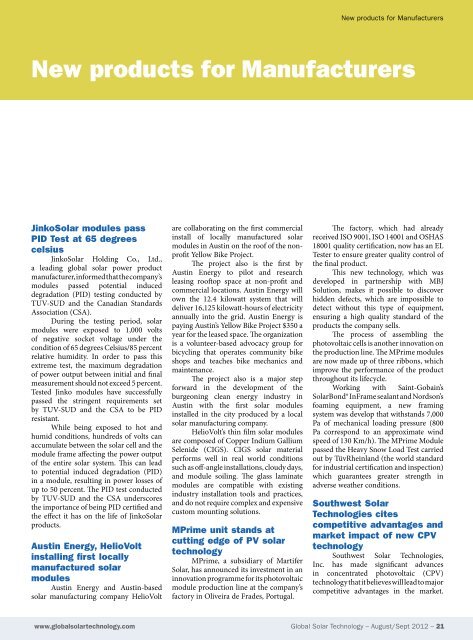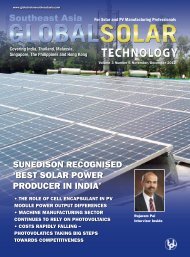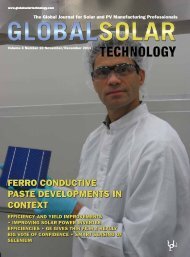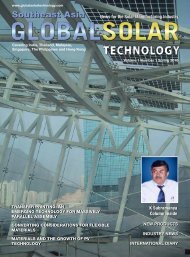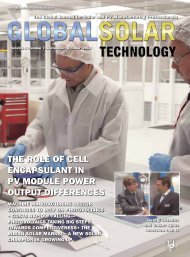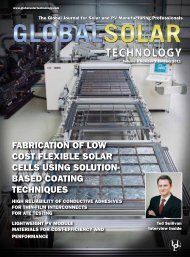Magazine SEA 3.5 Edition - Global Solar Technology
Magazine SEA 3.5 Edition - Global Solar Technology
Magazine SEA 3.5 Edition - Global Solar Technology
Create successful ePaper yourself
Turn your PDF publications into a flip-book with our unique Google optimized e-Paper software.
New products for Manufacturers<br />
Jinko<strong>Solar</strong> modules pass<br />
PID Test at 65 degrees<br />
celsius<br />
Jinko<strong>Solar</strong> Holding Co., Ltd.,<br />
a leading global solar power product<br />
manufacturer, informed that the company’s<br />
modules passed potential induced<br />
degradation (PID) testing conducted by<br />
TUV-SUD and the Canadian Standards<br />
Association (CSA).<br />
During the testing period, solar<br />
modules were exposed to 1,000 volts<br />
of negative socket voltage under the<br />
condition of 65 degrees Celsius/85 percent<br />
relative humidity. In order to pass this<br />
extreme test, the maximum degradation<br />
of power output between initial and final<br />
measurement should not exceed 5 percent.<br />
Tested Jinko modules have successfully<br />
passed the stringent requirements set<br />
by TUV-SUD and the CSA to be PID<br />
resistant.<br />
While being exposed to hot and<br />
humid conditions, hundreds of volts can<br />
accumulate between the solar cell and the<br />
module frame affecting the power output<br />
of the entire solar system. This can lead<br />
to potential induced degradation (PID)<br />
in a module, resulting in power losses of<br />
up to 50 percent. The PID test conducted<br />
by TUV-SUD and the CSA underscores<br />
the importance of being PID certified and<br />
the effect it has on the life of Jinko<strong>Solar</strong><br />
products.<br />
Austin Energy, HelioVolt<br />
installing first locally<br />
manufactured solar<br />
modules<br />
Austin Energy and Austin-based<br />
solar manufacturing company HelioVolt<br />
www.globalsolartechnology.com<br />
are collaborating on the first commercial<br />
install of locally manufactured solar<br />
modules in Austin on the roof of the nonprofit<br />
Yellow Bike Project.<br />
The project also is the first by<br />
Austin Energy to pilot and research<br />
leasing rooftop space at non-profit and<br />
commercial locations. Austin Energy will<br />
own the 12.4 kilowatt system that will<br />
deliver 16,125 kilowatt-hours of electricity<br />
annually into the grid. Austin Energy is<br />
paying Austin’s Yellow Bike Project $350 a<br />
year for the leased space. The organization<br />
is a volunteer-based advocacy group for<br />
bicycling that operates community bike<br />
shops and teaches bike mechanics and<br />
maintenance.<br />
The project also is a major step<br />
forward in the development of the<br />
burgeoning clean energy industry in<br />
Austin with the first solar modules<br />
installed in the city produced by a local<br />
solar manufacturing company.<br />
HelioVolt’s thin film solar modules<br />
are composed of Copper Indium Gallium<br />
Selenide (CIGS). CIGS solar material<br />
performs well in real world conditions<br />
such as off-angle installations, cloudy days,<br />
and module soiling. The glass laminate<br />
modules are compatible with existing<br />
industry installation tools and practices,<br />
and do not require complex and expensive<br />
custom mounting solutions.<br />
MPrime unit stands at<br />
cutting edge of PV solar<br />
technology<br />
MPrime, a subsidiary of Martifer<br />
<strong>Solar</strong>, has announced its investment in an<br />
innovation programme for its photovoltaic<br />
module production line at the company’s<br />
factory in Oliveira de Frades, Portugal.<br />
New products for Manufacturers<br />
The factory, which had already<br />
received ISO 9001, ISO 14001 and OSHAS<br />
18001 quality certification, now has an EL<br />
Tester to ensure greater quality control of<br />
the final product.<br />
This new technology, which was<br />
developed in partnership with MBJ<br />
Solution, makes it possible to discover<br />
hidden defects, which are impossible to<br />
detect without this type of equipment,<br />
ensuring a high quality standard of the<br />
products the company sells.<br />
The process of assembling the<br />
photovoltaic cells is another innovation on<br />
the production line. The MPrime modules<br />
are now made up of three ribbons, which<br />
improve the performance of the product<br />
throughout its lifecycle.<br />
Working with Saint-Gobain’s<br />
<strong>Solar</strong>Bond® InFrame sealant and Nordson’s<br />
foaming equipment, a new framing<br />
system was develop that withstands 7,000<br />
Pa of mechanical loading pressure (800<br />
Pa correspond to an approximate wind<br />
speed of 130 Km/h). The MPrime Module<br />
passed the Heavy Snow Load Test carried<br />
out by TüvRheinland (the world standard<br />
for industrial certification and inspection)<br />
which guarantees greater strength in<br />
adverse weather conditions.<br />
Southwest <strong>Solar</strong><br />
Technologies cites<br />
competitive advantages and<br />
market impact of new CPV<br />
technology<br />
Southwest <strong>Solar</strong> Technologies,<br />
Inc. has made significant advances<br />
in concentrated photovoltaic (CPV)<br />
technology that it believes will lead to major<br />
competitive advantages in the market.<br />
<strong>Global</strong> <strong>Solar</strong> <strong>Technology</strong> – August/Sept 2012 – 21


